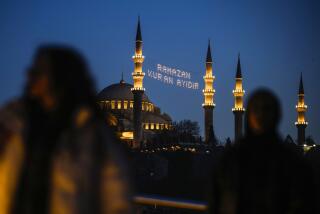Culture : Kurds Keep Their Troubled History Alive Through Music
- Share via
ISTANBUL, Turkey — “Sometimes you cry, sometimes you moan; What is your trouble? You hide it alone....”
So go the opening lines of a typical song of the Kurds, an unhappy Middle Eastern people suddenly thrust into the international limelight by their post-Gulf War guerrilla success in northern Iraq.
That success has raised Kurdish hopes that their 25 million people, divided among Turkey, Iran, Iraq and the Soviet Union, may again be moving closer to an oft-dashed dream of political unity.
Tuning in to a new Iraqi rebel radio station, Voice of Kurdistan, Kurds all over the region have been celebrating, often drawing up in lines to dance the folkloric steps they have followed for centuries while accompanied by the beat of a simple pipe and drum.
This rebellion may be crushed, as dozens of Kurdish nationalist revolts have been crushed before. But here in Turkey, at least, the Kurds appear to have emerged from the war with some lasting gains.
For decades, Turkey--which is home to half the world’s Kurds--tried to deny that a separate Kurdish culture even existed. But now even Turkey is recognizing that attempts to stifle Kurdish culture have failed.
President Turgut Ozal has said that he will soon allow Kurdish music, one of the most potent vehicles of Kurdish culture and popular sentiment, to break free of chains so heavy that at one time, even instrumental works by Kurds were banned.
“The Kurds have been oppressed for a long time,” said Sirvan Perwer, a well-known Kurdish singer who fled Turkey 15 years ago. “The Kurdish people could only tell its loves and sorrows by song.”
Perwer, 36, spoke by telephone from Stockholm, where he now lives. His music, long circulated underground here, still enjoys a loyal audience estimated in the millions. He also tours abroad and is currently planning concerts in San Diego, Los Angeles and New York in mid-April.
There is no doubt in Perwer’s mind that Kurdish music is special. Its shepherd flute and tenbur lute are unique. The music uses a simpler, brighter chromatic scale than its Persian or Arabic neighbors, and it typically stretches the singer’s range to the maximum.
“The best can sing three octaves and go very high,” said Perwer. “I think it’s the mountain air that helps.”
Above all, musicians say, the music’s beauty lies with the many dialects of the Kurdish language, an Indo-European cousin of Persian with melodic cadences and a natural rhythm.
“Kurdish was made for music,” said Kazim Bozova, leader of a musical group in Turkey called Koma Sirwan, or The Lions of Van (a Kurdish town).
In fact, traditional Kurdish folk music sometimes consists of just words sung by an ozan , or traveling minstrel. Ozans would tour Kurdish villages with their epic songs, each lasting a full evening. Now, one such epic song fills two or three tape cassettes.
Wailing and staccato by turns, the repetitive lyrics reflect the codes of Kurdish culture, telling of personal, family and tribal honor, of the loneliness of the outlaw’s camp in the mountains, of the blood feuds and of frustrated love. Some of the music was used to dampen grief at the funerals of young people.
Sorrow has carried through to modern compositions now appearing in Turkey. Like popular Turkish music, which is heavily influenced by Kurdish themes, the singer tries to put into words the hardships, poverty and frustrations of everyday life.
“Oh no, no, no!
Come mother, I am nearly dead,
Bury my sorrow deep in my grave,
I am weak, I am alone,
Oh no, no, no!
I have seen no good in my life,
I have had no lover,
Oh no, no, no!
My pain is dreadful, oh, oh, oh.”
In recent years Western rhythms, percussion, electronic instruments and even an electric lute have appeared in Kurdish music. One collector in Istanbul talked wistfully of his wish to get hold of a cassette recently issued in London and featuring Kurdish rap.
Most Kurdish cassettes are produced among the big exile communities in Sweden and Germany. The promise of liberalization in Turkey has sent producers rushing to studios here, too, although President Ozal’s action has left the situation somewhat murky. Although he has promised to lift the legal barriers, Parliament has yet to act. Meanwhile, enforcement of the old law is inconsistent.
“After Ozal’s statement (on Jan. 31), we added Kurdish lyrics to an instrumental work and sold 30,000 cassettes in 15 days,” said Nezihi Kilickini, a Turkish producer. “Then, 10 people came around from the Culture Ministry to take away the license.” But the officials did not bother to confiscate existing cassettes, Kilickini added.
Even if Kurdish music is allowed to emerge fully above ground, however, the Turkish state is likely to keep a close eye on lyrics.
“The government already basically only allows love stories,” said Kadir Karakoc, a cassette salesman and Kurdish music enthusiast. “But people are not singing about shepherds and village sweethearts any more. It’s become more rhythmic, marching, a synthesis of Western music with a political message.”
There are at least 30 Kurdish guerrilla groups operating in areas inhabited by Kurds, and their music cassettes, sold in every Kurdish town, provide an ideal medium for propaganda.
Packaging for such cassettes is typically shot through with the red, yellow and green national colors of Kurdistan, and picture Kalashnikov semiautomatic rifles, lines of brightly dressed Kurdish folk dancers, and the invariably anguished, angrily pleading faces of the stars.
The main guerrilla group in Turkey, the Marxist Kurdish Workers Party (PKK), even has a choir. Its repertoire features titles such as the “Internationale,” “Partisan” and “Kurdistan Will Be Free.”
While political unity among the rival guerrillas, tribes and states of Kurdistan may still be a dream, Sivan Perwer said the victories of the rebels in northern Iraq have inspired him to be unusually upbeat.
“I have been waiting for this day, I am excited. I have written a new song called ‘Happy Days are Coming,’ ” Perwer said. “But I still can’t go home.”
More to Read
Sign up for Essential California
The most important California stories and recommendations in your inbox every morning.
You may occasionally receive promotional content from the Los Angeles Times.













